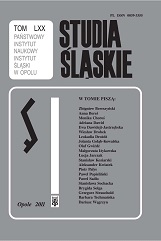Cieszyn i Český Těšín – partnerstwo transgraniczne miast bliźniaczych
Cieszyn and Český Těšín – trans-border partnership of twin cities
Author(s): Wiesław Drobek, Ewa Dawidejt-JastrzębskaSubject(s): Politics / Political Sciences
Published by: Instytut Śląski
Keywords: Cieszyn; Český Těšín; trans-border partnership; division and develpment; European Union
Summary/Abstract: The object of the analysis made in the article is the cooperation of the cities of Cieszyn (Teschen) and Český Těšín (Czech Teschen) located on the border between Poland and the Czech Republic. Teschen was divided into two separate cities by the state border in 1920. For practical reasons certain forms of cooperation between the two (especially as regards water, gas and electric power supply, or access to places of religious cult) existed even during the periods of conflicts between the two states, including ones over the borderline. The possibilities of making free contacts between the communities on the either side of the border became radically restricted due to political developments in 1980 (the formation of the Solidarity movement). Again, some closer contacts between the communities were re-established in 1991 and a broader cooperation was commenced in 1996, following the signing of the agreement on partnership of the two cities. The establishment of the Euroregion Śląsk Cieszyński–Těšínské Slezsko (Teschen Silesia) in 1998 made it possible to enliven the cooperation. This particularly concerns realization of trans-border enterprises based on the means which are jointly obtained from the European Union. The accession of Poland and of the Czech Republic to the European Union (2004) raised high hopes with respect to liquidation of the negative effects of the division of 1920, with the specific character resulting from the belonging to different states being simultaneously preserved. Joint actions aiming at overcoming barriers in communication between the two cities were on the rise then, including both the natural conditions (the river) and the sphere of consciousness (resentments and prejudices). Each of the cities separated by the Olza River began to take into consideration the need to cooperate with the twin city in the field of their development strategies: there appeared even fragmentary concepts of spatial management of the frontier areas. Entering the Schengen Zone (2007) created new possibilities of cooperation (especially in the sphere of communication and common care for safety on the part of relevant services in both cities), although it also brought about new problems (e.g. Ones with reference to differing regulations in each state, relating to legality/illegality of possessing small amounts of drugs, running of amusement arcades, sales of smart drugs).
Journal: Studia Śląskie
- Issue Year: 2011
- Issue No: 70
- Page Range: 73-92
- Page Count: 20
- Language: Polish

